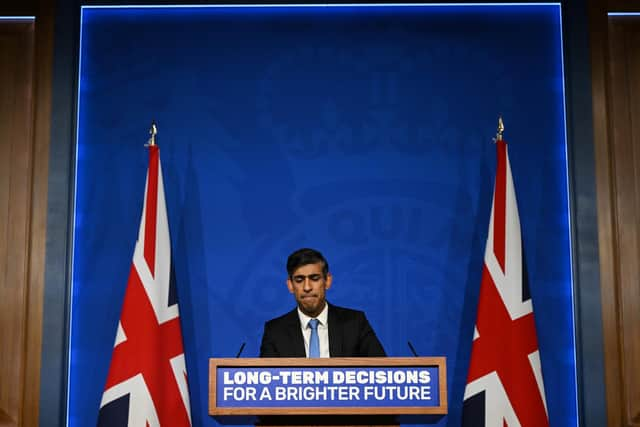Net zero is a clear choice for voters between paying more and paying less - Bill Carmichael
But really, is it much of a gamble? The Prime Minister is betting that given the choice between paying less or paying more, voters will invariably choose the former - and he is on solid ground in that assumption.
Because the biggest lie in the whole net zero debate is that it can be achieved with no additional cost to ordinary people. That is nonsense.
Advertisement
Hide AdAdvertisement
Hide AdSome estimates put the cost of net zero to the UK as high as £1.4 trillion, and invariably the biggest burden will fall on the poorest.


Mr Sunak is a shrewd political operator, and I am sure that he has calculated that whilst people are in favour of green policies in the abstract, their support evaporates once they start hitting them in the pocket.
For example, if you asked Londoners if they are in favour of cleaner air they will enthusiastically say yes.
But once they are hit with a £12.50 daily charge for simply driving to work - about £250 a month for a typical worker - that enthusiasm wanes dramatically.
Advertisement
Hide AdAdvertisement
Hide AdIndeed, many political commentators have pointed to the Conservatives' opposition to the expansion of London’s ultra low emission zone (Ulez) as a key factor in their unexpected victory in the Uxbridge and South Ruislip by-election in the summer. A fact that will not have gone unnoticed in Downing Street.
And, as with all “green” policies, it is the poorest in society that are hit hardest.
For example, if you can afford to pay £43,000 for a brand new Tesla electric car, you don’t pay the charge. But if you are a plumber trying to make a living with a ten-year-old diesel van, you get absolutely hammered.
Similarly, if you can afford to cover the roof of your detached house in the leafy suburbs with solar panels, you will be rewarded with a fat subsidy courtesy of the taxpayer.
Advertisement
Hide AdAdvertisement
Hide AdYet freezing pensioners desperately trying to keep their homes warm are hit with so-called “green” taxes on their energy bills in order to subsidise their wealthier neighbours.
“Green” policies are a bit like Robin Hood in reverse - stealing from the poor to give to the rich.
But even if you put aside the questionable morality of green policies, there are massive practical obstacles to achieving net zero.
We will, for example, need to replace about 26 million gas boilers with massive costs to householders, and it isn’t clear what happens to houses that are not suitable for heat pumps.
Advertisement
Hide AdAdvertisement
Hide AdWe will need to expand the charging point network for electric vehicles, and again it isn’t clear what happens in terraced streets with no driveways, or people living in blocks of flats, where overnight charging is not possible.
And if we are all charging our electric vehicles at home and installing electric heat pumps, there will need to be a big upgrading of the electricity distribution system to cope with much increased demand.
Who is going to pay for that? Take a guess.
And then the fundamental question - where is all this extra electricity coming from? If we get rid of all fossil fuels in electricity generation, we are going to need an alternative.
Increasing generation from renewable sources, such as solar and wind, is a great idea, but because they are intermittent and unreliable, we need something else to provide the “base load” of electricity for those times when the sun doesn’t shine and the wind doesn’t blow.
Advertisement
Hide AdAdvertisement
Hide AdThe only viable alternative is low carbon nuclear power, although many environmentalists hate the idea. But the scale of new nuclear power required is huge.
One estimate is that we would have to build another 40 nuclear power plants the size of Hinkley Point C at a cost of over £1 trillion.
That is just not going to happen, particularly given the opposition to nuclear power by the same groups that got us into this mess in the first place.
Probably the most ridiculous thing I’ve heard over recent days is that the UK is risking losing its “world leadership” on green energy. Do they really think China and India care a hoot about British policy as they open yet another coal-fired power station?
Advertisement
Hide AdAdvertisement
Hide AdLabour immediately announced it would reverse the delays announced by Mr Sunak, so at least there is clear green water between the two big parties.
And voters will be faced with a stark choice come the election - do you want to pay more, or less? Let’s see what they decide.